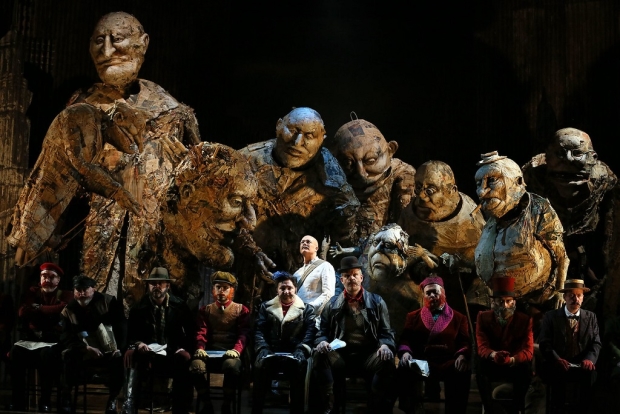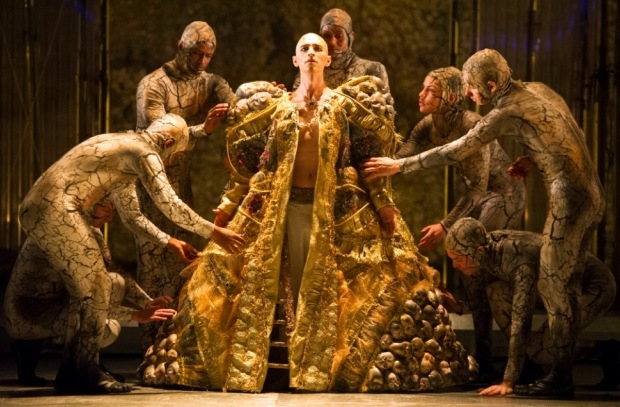Review: Satyagraha (London Coliseum)

© Donald Cooper
While ‘Satyagraha’ was the Sanskrit name given to Mahatma Gandhi’s policy of passive resistance against British rule in India, the core message of Satyagraha the opera, as emblazoned in projections by 59 Productions, is the denial of self. Philip Glass‘s minimalist epic deals in humility, the acceptance of pain and the virtues of asceticism; yet musically he doesn’t put his money where his mouth is. The three-act score is awash with romantic motifs, lush harmonies and melodic snatches – all of them brief and all on replay.
There’s a ton of self on the stage too, thank goodness. I really ought to bemoan the absence of chattel-denying simplicity in Phelim McDermott‘s ENO/Improbable production, here revived for the third time since 2007 (although this was my first encounter with it), but where would we be without his imagination? Satyagraha may be the gloomy yin to Akhnaten‘s gilded yang – Glass’s sun god opera was treated with brilliance by the same team not long ago – but it is just as arresting a spectacle. Massive set pieces involving giant puppets, lengths of sellotape and a moonlit flight elicit gasps, though it’s tiny moments of invention, many involving newspapers, that give the greatest satisfaction. They’re the sackful of sugar that helps the musical medicine go down.
Glass’s compositional language is attractive but not the stuff of traditional opera, so let’s think of Satyagraha on its own terms: as an art installation where glimpses of a life evoke rather than relate the experiences that shaped Gandhi’s persona. The sung Sanskrit is deliberately indecipherable (there are no surtitles), the programme synopsis is all but impenetrable, certainly in the short time most people will have to read it before the lights go down, and the action jumps about with a joyous disregard for linear storytelling. Instead it’s all about sensations, and any enlightenment about Gandhi the man reaches us by osmosis.
A shaven-headed Toby Spence invested the role of Gandhi with dignity and an eerie stillness. Although rarely if ever absent from the stage, he remained silent for such long periods that each utterance of his golden tenor timbre seemed haloed with numinosity. That's not an appropriate sensation for the resolutely human Mr G, but it was a magical one nonetheless.
The supporting cast was sterling, none more so than the transcendent ENO Chorus, who made the relentless choral writing seem effortless. As Gandhi’s secretary, Charlotte Beament’s coloratura soprano was quite the most radiant sound heard all evening, while among the men Nicholas Folwell stood out, as so often, for his clear baritone contributions as Mr Kallenbach. And Improbable‘s skills ensemble lived up to their company’s name with visual work of the utmost delicacy and precision.
Typically, Glass’s intense melodic and harmonic moments plunge hypnotically into musical whirlpools, spin round and round and then leap up for air. His third act in particular is a bedazzlement of scales and arpeggios, although none of it gave conductor and Glass specialist Karen Kamensek much scope for interpretation. She merely had to hold on tight to the musical reins, which she did very securely. The imaginarium of Phelim McDermott, on the other hand, remains a phenomenon that cries out to be seen. Four stars to him and to associate director and designer Julian Crouch for an eye-filling achievement.
Satyagraha continues in repertory at the London Coliseum until 27 February.











